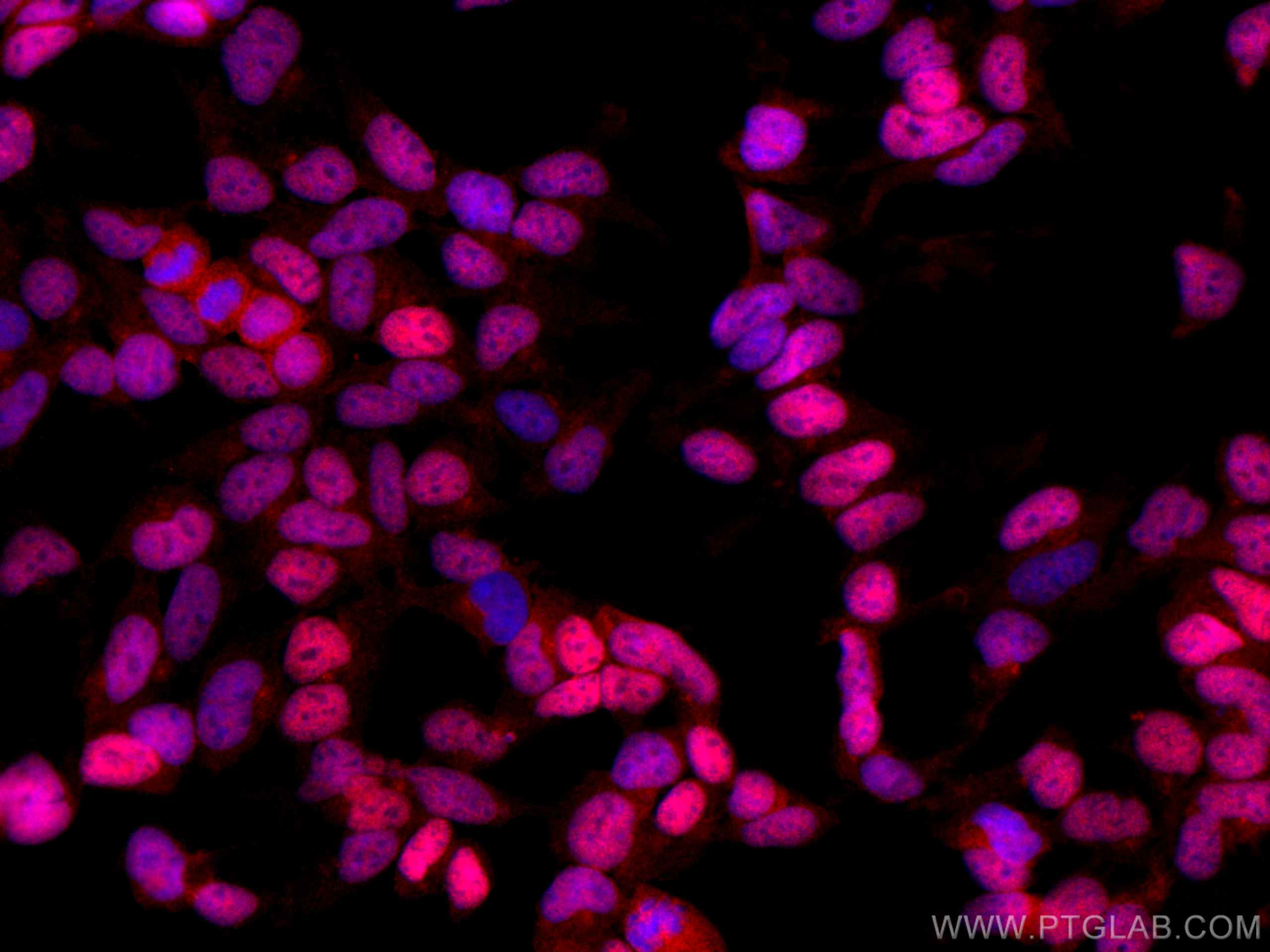Tested Applications
| Positive IF/ICC detected in | HEK-293 cells |
Recommended dilution
| Application | Dilution |
|---|---|
| Immunofluorescence (IF)/ICC | IF/ICC : 1:50-1:500 |
| It is recommended that this reagent should be titrated in each testing system to obtain optimal results. | |
| Sample-dependent, Check data in validation data gallery. | |
Product Information
CL594-10914 targets DACH1 in IF/ICC applications and shows reactivity with human samples.
| Tested Reactivity | human |
| Host / Isotype | Rabbit / IgG |
| Class | Polyclonal |
| Type | Antibody |
| Immunogen |
CatNo: Ag1354 Product name: Recombinant human DACH1 protein Source: e coli.-derived, PGEX-4T Tag: GST Domain: 176-521 aa of BC021219 Sequence: QHGADSENGDMNSSVGLELPFMMMPHPLIPVSLPPASVTMAMSQMNHLSTIANMAAAAQVQSPPSRVETSVIKERVPDSPSPAPSLEEGRRPGSHPSSHRSSSVSSSPARTESSSDRIPVHQNGLSMNQMLMGLSPNVLPGPKEGDLAGHDMGHESKRMHIEKDETPLSTPTARDSLDKLSLTGHGQPLPPGFPSPFLFPDGLSSIETLLTNIQGLLKVAIDNARAQEKQVQLEKTELKMDFLRERELRETLEKQLAMEQKNRAIVQKRLKKEKKAKRKLQEALEFETKRREQAEQTLKQAASTDSLRVLNDSLTPEIEADRSGGRTDAERTIQDGRLYLKTTVMY Predict reactive species |
| Full Name | dachshund homolog 1 (Drosophila) |
| Calculated Molecular Weight | 79 kDa |
| GenBank Accession Number | BC021219 |
| Gene Symbol | DACH1 |
| Gene ID (NCBI) | 1602 |
| RRID | AB_2919754 |
| Conjugate | CoraLite®594 Fluorescent Dye |
| Excitation/Emission Maxima Wavelengths | 588 nm / 604 nm |
| Excitation Laser | Yellow-Green Laser (561 nm) |
| Form | Liquid |
| Purification Method | Antigen affinity purification |
| UNIPROT ID | Q9UI36 |
| Storage Buffer | PBS with 50% glycerol, 0.05% Proclin300, 0.5% BSA, pH 7.3. |
| Storage Conditions | Store at -20°C. Avoid exposure to light. Stable for one year after shipment. Aliquoting is unnecessary for -20oC storage. |
Background Information
DACH1, a homologue of the Drosophila dachshund gene, is a key regulator of cell fate determination during eye, leg, and brain development in the fly. Through interacting with NCoR and Smad4, DACH1 is able to inhibit the transforming growth factor-beta (TGF-beta) signaling pathway. DACH1 can inhibit breast cancer cellular proliferation via cyclin D1, suggesting a possible role in tumor suppression. Additionally, DACH1 plays an important role in negative regulation of RANKL (Receptor activator of NF-kappaB ligand ) gene expression in marrow stromal/preosteoblast cells. Dach1 expression is enriched in rECs, which are associated with osteoprogenitors and bone-resorbing osteoclasts, and overexpression of DACH1 in postnatal mice induces a strong increase in arteries and type R capillaries, leading to local metabolic changes and enabling trabecular bone formation in normally highly hypoxic areas of the diaphysis (PMID: 39528700). Moreover, Loss of DACH1 expression might be involved in endometrial cancer progression. Four isoforms of DACH1 are produced by alternative splicing. This antibody is a rabbit polyclonal antibody raised against residues near the C terminus of human DACH1. The antibody is conjugated with CL594, Ex/Em 593 nm/614 nm.
Protocols
| Product Specific Protocols | |
|---|---|
| IF protocol for CL594 DACH1 antibody CL594-10914 | Download protocol |
| Standard Protocols | |
|---|---|
| Click here to view our Standard Protocols |




